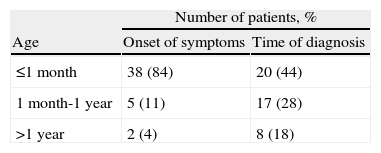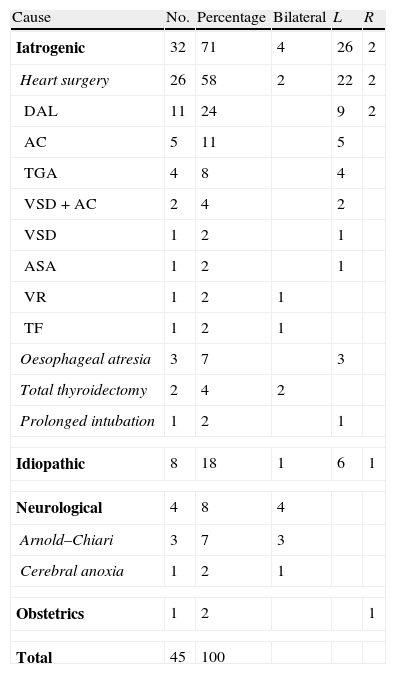Vocal fold paralysis (VFP) is a relatively common cause of stridor and dysphonia in the paediatric population. This report summarises our experience with VFP in the paediatric age group.
Methods and materialsThis was a retrospective review of 45 consecutive patients presenting with VFP over a 12-month period. The diagnosis was performed by flexible endoscopic examination. The cases were evaluated with respect to aetiology of the paralysis, presenting symptoms, delay in diagnosis, affected side, vocal fold position, need for surgical treatment and outcome.
ResultsThe presenting symptoms were stridor and dysphonia. Iatrogenic causes formed the largest group, followed by idiopathic, neurological and obstetric VFP. Unilateral paralysis was found in most cases. The median value for delay in diagnosis was 1 month and it was significantly higher in the iatrogenic group. Only eight patients (18%) underwent surgical treatment.
ConclusionsThe diagnosis of VFP may be suspected based on the patient's symptoms and confirmed by flexible endoscopy. Infants who develop stridor or dysphonia following a surgical procedure have to be examined without delay. The surgeon has to keep in mind that there is a possibility of late spontaneous recovery or compensation.
La parálisis laríngea es una causa relativamente frecuente de estridor y disfonía en la edad pediátrica. Este artículo describe nuestra experiencia en parálisis laríngea en población pediátrica.
MétodosSe incluyeron en el estudio todos los pacientes que acudieron a consulta con el diagnóstico de parálisis laríngea durante un año completo. Se examinaron las historias clínicas de forma retrospectiva. El diagnóstico de parálisis laríngea se llevó a cabo mediante exploración clínica con nasofibroscopio flexible. Se registraron los siguientes datos: etiología de la parálisis, síntomas de presentación, retraso en el diagnóstico, lado afecto, posición de la cuerda vocal y tratamiento recibido.
ResultadosLos síntomas de presentación más frecuentes fueron el estridor y la disfonía. La mayor parte de los casos eran de origen iatrogénico, seguido por los casos idiopáticos, neurológicos y obstétricos. La mayoría de los pacientes tenían una parálisis unilateral. El retraso medio en el diagnóstico fue de un mes, y fue significativamente mayor en los casos iatrogénicos. En la mayor parte de los casos no fue necesario ningún procedimiento quirúrgico como tratamiento.
ConclusionesEl diagnóstico de parálisis laríngea se sospecha por la clínica y se confirma por la exploración endoscópica. Los niños que presentan estridor tras un procedimiento quirúrgico deben ser examinados sin demora. Se debe tener en cuenta la posibilidad de recuperación espontánea o de compensación en las parálisis laríngeas.







